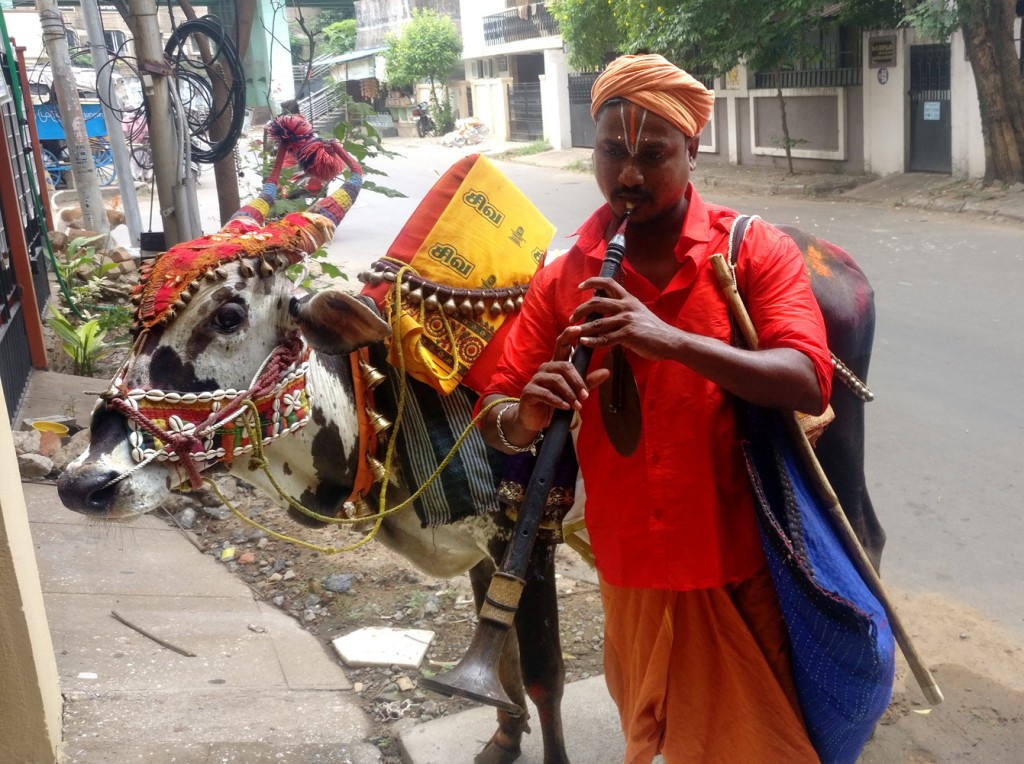Be it Diwali, Pongal or the Tamil New Year, the boom boom maadu is part of the festivities in most parts of Tamil Nadu, although it is becoming a rarity in urban locations of late. Excited children run to the gate as soon as they hear the sound of the nadaswaram played by the man accompanying a colourfully clothed bovine. The man and his ox go from house to house asking for some help, mostly clothes — a sari or dhoti, or sometimes a bedsheet or a blanket, and rice.

There was a time when mothers would scare their children saying that they would hand them over to the ‘boom boom maattukarar’ (owner of the performing ox) if they misbehave. The very thought of the huge ox and its oddly-dressed owner used to send shivers down the spine of the young. Often people draw the analogy using the term ‘boom boom maadu’ to denote a weak-willed person and one who just nods his head for everything.
This Pongal I got to ‘greet’ these guests at my home. The moment I heard the nadaswaram I ran to the gate armed with some bananas. I thought it perfect to feed the ox on such an auspicious day. As I give a banana to the ox — his name is Gopalakrishnan, his owner Narasimhan tells me — he goes on to ask the animal in Tamil, “Ammavukku padhavi uyarvu iruka, Gopala? (Is there a promotion for the lady)?” The ox nods his head vigorously in the affirmative, with the bells in his horns and neck jingling pleasantly, and another nod to a question prompted by me if my daughter will pursue journalism like me. It however shook its head in the negative answering a prediction if she will settle down abroad!
Unfortunately, it will end with me. My son is not interested in this tradition. He wants to work in ‘an AC office’.
I strike up a conversation with Narasimhan after filling his bag with some rice and placing a blanket on the ox’s back. He is a third generation practitioner of this traditional vocation. “Unfortunately, it will end with me. My son is not interested in this tradition. He wants to work in ‘an AC office’, he says,” says Narasimhan. This community is popular in Madurai, Trichy, Coimbatore and Chennai and live in tribes, mostly on the city’s outskirts. The men and their oxen move out of their hamlets and trudge across a city for about 25 days a month, going door-to-door collecting alms by making the animals nod to the drum beats — mainly the eerie ‘boom boom’ sound created by rubbing the sticks on the drum hung on the shoulders. They earn as much as they can and spend about 5–6 days with their families before embarking on the next journey.
We are happy that there still are some people who consider it auspicious when our ox wishes them well.
Once a ubiquitous lot, their numbers have dwindled now. “People in cities are flooded with entertainment avenues. Not many are interested in watching an ox nod its head or perform some antics. It has cost us dearly for we know no other job,” he laments.
The oxen are given to the community by temples where people donate the animals as a form of thanksgiving to god when their wishes are fulfilled. “We are happy that there still are some people who consider it auspicious when our ox wishes them well,” smiles Narasimhan and, lo and behold, Gopalakrishnan nods his head excitedly. As the two get ready to leave, the ox performs a cute little dance — just to show off his anklets! The visitors did bring us some good tidings during the day.






